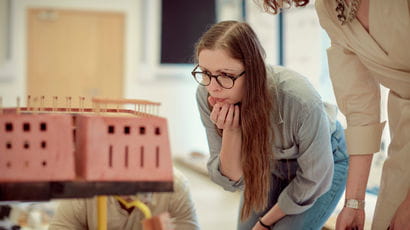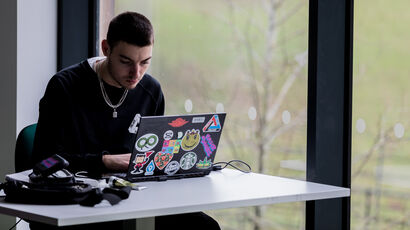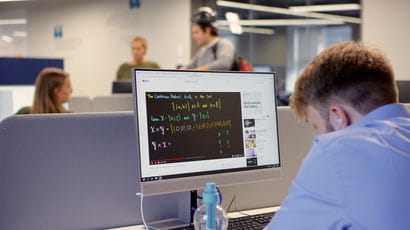Research in the College of Arts, Technology and Environment
The College of Arts, Technology and Environment (CATE) has a vibrant research culture, supporting a large range of exciting and impactful research across all our subject areas. Funded by a range of external funding bodies, our research impacts on industry and society, and enriches the experience of our students.
Research centres

Bristol Robotics Laboratory
A collaborative partnership between UWE Bristol and the University of Bristol that is home to a vibrant community of over 300 academics, researchers and industry practitioners.

Centre for Advanced Built Environment Research
Developing innovative approaches, procedures, technologies and techniques that support the design, management, reconfiguration, maintenance and operation of buildings.

Centre for Environment, Society and Resilience
Undertaking research which advances our understanding of the interactions between the environment and society to inform and influence policy and people.

Centre for Machine Vision
Part of the Bristol Robotics Laboratory (BRL), we solve real-world practical computer vision problems with excellence in 3D reconstruction and surface inspection.

Centre For Print Research
Innovating, contemplating and understanding all aspects of fine print, from developing new inks and 3D printable ceramic materials to disruptive printing technologies and collaborating with international artists.

Centre for Sustainable Planning and Environments
Developing understanding of how to achieve places that are environmentally sustainable, socially just and economically competitive.

Centre for Transport and Society
Improving and promoting understanding of the inherent links between lifestyles and personal travel in the context of continuing social and technological change.

Computer Science Research Centre
Researching activities cover many of the facets of 21st century computer science, from artificial intelligence to graphene sensors for IoT applications.

Digital Cultures Research Centre
An open and collaborative network of critical thinkers and doers. We interrogate, articulate and create practical approaches to responsible technological futures.

Science Communication Unit
An internationally renowned research centre known for its diverse and innovative activities designed to engage the public with science.
Research groups

Architecture Research Group
Bringing researchers together leading to new collaborations and research projects that can tackle societal challenges through an architectural lens.

Creative Technologies Lab
An interdisciplinary research group that spans and intersects computer science and the creative arts with the aim of creating and evaluating seamless interfaces between people and technology.

Engineering, Modelling and Simulation Group
Bringing academics and researchers together to carry out high quality research in key engineering fields by applying modern and advanced modelling and simulation techniques.

Humanities Research Group
Conducting interdisciplinary challenge-led research, built on fundamental processes of inquiry that work across History, Literature, Linguistics, Media and Creative Practice.

Mathematics and Statistics Research Group
A research group that aims to deliver internationally excellent mathematics research, develop research collaboration and apply its research to outstanding learning.

Screen Research
Representing the full range of moving image research, including media industries, screen cultures, media politics and activism, genre, stardom and performance, and screen media practice research.

Unconventional Computing Laboratory
Employing complex dynamics in physical, chemical and biological media to design novel computational techniques, architectures and working prototypes of non-linear media based computers.

Visual and Material Practices Research Group
Research into visual and material practices drawn from creative disciplines including fashion, photography, design, fine art, creative writing, drawing, visual culture, performance and print.
Networks

Institute of Bio-Sensing Technology
Designing complex biological tests and incorporating those tests into prototype devices using microfluidics and bespoke electronics; the first of its kind in the UK.

Robotics Engineering And Computing for Healthcare
Researching robotics technologies, intelligent sensors and machine learning to realise person-focused innovative healthcare solutions.

WHO Collaborating Centre for Healthy Urban Environments
Promoting healthy and sustainable settlements through research, teaching, consultancy, knowledge exchange and publications.
Research themes
Geosciences
This research theme brings together natural sciences perspectives on key sustainability and resilience challenges relating to river and coasts, rock weathering and stone heritage, hydrogeology, sedimentology and volcanism.
Civil Engineering
UWE Bristol research and knowledge exchange related to sustainability and climate change resilience includes work on structural engineering, materials science, geotechnics, flood and coastal defence and water quality engineering.
UWE Bristol is a university in which maintaining and extending research strength is one of our key priorities. Our emphasis is on ‘research with impact’ – research which contributes to knowledge, which enriches teaching and learning and which impacts upon the world beyond academia.
The College of Arts, Technology and Environment (CATE) has a well-established and continuously developing research environment.
We have a strong track record of securing prestigious research grants from national research councils as well as research and consultancy from the UK government, the European Union and a wide range of clients in the private, public and voluntary sectors.
Our intention is to continue to enhance our reputation for conducting research which is of direct relevance to industry, society and the environment and which combines academic excellence with relevance to policy and practice. You can read how our research is changing your world.
Also see research ethics - UWE Bristol's commitment to conducting research to the highest possible standards.
We hope the information provided is helpful to you, but please get in touch if you would like to know more.
Professor Elena Marco
Pro Vice-Chancellor and Head of College
College of Arts, Technology and Environment
E-mail: Elena.Marco@uwe.ac.uk
Professor Jessica Lamond
College Dean of Research and Enterprise
College of Arts, Technology and Environment
E-mail: Jessica.Lamond@uwe.ac.uk
Transforming tomorrow, today.
Our unique approach to research, innovation, skills, enterprise and just and ethical practices is driving societal improvements and transforming futures for the better.
RISEPostgraduate research study options
Our Doctoral Academy offers you the opportunity to contribute to our dynamic and leading edge research.
Postgraduate research studyResearch by school

Research in the School of Architecture and Environment
Our extensive programme of research and consultancy combines academic excellence and policy relevance, and holds a well-established national and international reputation.

Research in the School of Arts
Research in the School of Arts maintains our established reputation, nationally and internationally, across a range of disciplines.

Research in the School of Computing and Creative Technologies
Our research covers a wide range of subjects within the fields of computer science, computer systems and information systems.

Research in the School of Engineering
Our research applies novel engineering, statistical and mathematical techniques to solve problems of direct relevance to industry, society and the environment.
